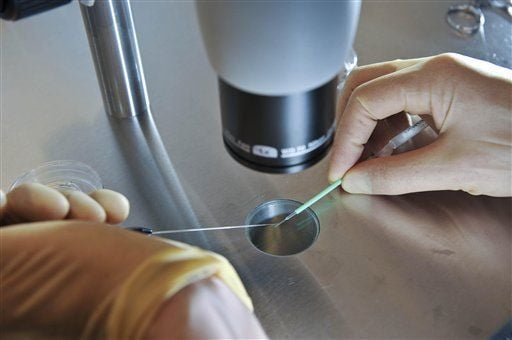PHOENIX — A divorced woman is entitled to implant some fertilized embryos despite the objections of her former husband, the state Court of Appeals has ruled.
In a split decision, the majority acknowledged that the contract Ruby Torres and John Terrell signed with a clinic doing in-vitro fertilization says that in the event of separation or divorce, the embryos could be used solely with the “express, written consent” of both parties.
Now, post divorce, Torres wants to implant the embryos if and when she remarries. Terrell, who does not consent, got a trial judge to rule that she can’t do that.
But appellate Judge Jennifer Campbell, writing for the majority, said that, on balancing the interests of both parties, Torres is entitled to do with the eggs what she wants. Campbell said it is irrelevant that if Torres gets the embryos, Terrell could be legally responsible for child support.
Friday’s ruling drew a stinging dissent from Judge Maria Elena Cruz, who chided her colleagues for ignoring the plain language of the contract the pair signed.
What makes the case particularly noteworthy is that Torres got the Arizona Legislature to approve a new law last year. It says judges must grant viable embryos to whichever parent will agree to allow them to be born, regardless of what a couple decided when first having an embryo frozen.
That means Arizona law now says a man’s decision he no longer wants to be a parent could be overridden if his ex-wife wants to become a mother.
But it also means a woman could wind up having no say if her former husband gives the frozen embryos to a new spouse who would give birth to a child biologically related to her.
That law, however, was not a factor in Friday’s ruling, with the judges saying they cannot be bound by a statute that didn’t exist at the time.
Attorney Claudia Work, who represents Terrell, said he is “weighing his options” on whether to seek a state Supreme Court review.
Court records show Torres was diagnosed in 2014 with bilateral breast cancer, and her oncologist said she would need to begin chemotherapy within a month. The doctor also told her that treatment would impair her ability to become pregnant.
Terrell, then her boyfriend (and future husband), agreed to be the donor after learning she had asked someone else.
An agreement provided by Bloom Reproductive Institute spelled out that any resulting embryo would be their joint property. Both also agreed to a provision that said in the case of divorce, it would be up to a judge to decide whether to allow the embryo to be used to achieve pregnancy or to donate it to another couple.
What ultimately occurred is the trial judge directed the fertility clinic to donate any remaining embryos to a third party or couple, concluding that Terrell’s “right not to be compelled to be a parent outweighed Torres’ right to procreate and desire to have a biologically related child.”
Campbell, writing for herself and appellate Judge James Beene, said that decision was flawed.
“Applying this approach invites individuals to hold hostage their ex-partner’s ability to parent a biologically related child in order to punish or to gain other advantages,” she wrote. “We decline to give one party a blanket veto.”
Campbell acknowledged that contract requires the “express, written consent of both parties” before embryos can be used to create a pregnancy. But she said that is overridden by the other provision that allows a trial judge to decide the fate of the embryos.
What also weighs in favor of Torres, Campbell said, is that she has a less than 1 percent chance of becoming pregnant by normal means and only a “remote possibility” of adoption or insemination with a donor embryo.
Cruz, in her dissent, said the other two judges were ignoring a constitutional provision that says the state cannot interfere with contracts.
She agreed that the agreement the couple signed did leave the fate of the embryos up to a trial judge. But Cruz said that fails to recognize the mutual-consent requirement to use them.
“Nothing in the agreement states that a court is free to disregard the other terms of the agreement when it decides the question,” she wrote.





